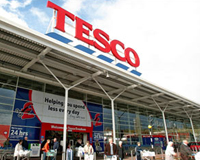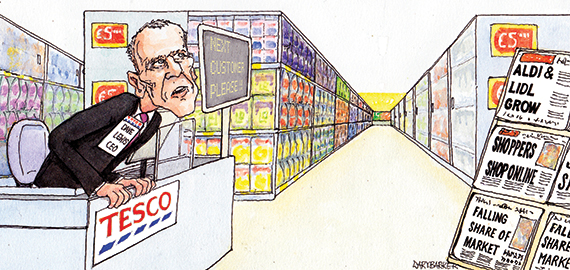How the mighty has fallen. For more than 20 years, Tesco was a byword for retailing success. Trailing Sainsbury’s as the UK’s second-biggest retailer in the early 1990s, its meteoric rise has seen it become the third-largest retailer on the planet. But the past two years have been brutal: misguided overseas ventures, notably in the US, and poor performance in the UK. Then an accounting scandal led to the suspension of eight senior UK executives.
Where did it all go so wrong? In simple terms, Tesco did not make sufficient provision for the bad times. While things were going well, the business was content to keep its foot on the accelerator, without looking in the rear-view mirror. In so doing, it failed to invest adequately in its core – the vast portfolio of UK stores it built up over the glory years. As part of this oversight, it failed to connect to customers in the same way it had previously. It became complacent.
Not all of Tesco’s wounds have been self-inflicted. None of the “big four” is blazing a trail through the UK grocery market. Basket sizes are shrinking as consumers shop little and more often. The discounters are gaining share and traffic is slowly being diverted away from big-box superstores.
The net result is that grocery sales are under massive downward pressure. This has little to do with macro economics – UK grocers rode out the recession well and their troubles set in only when the macro economy was on the road to sustained recovery. Grocery volumes are in freefall and declining inflation is also rapidly eroding value growth. Before long, we will be in the perilous, and unprecedented, situation of seeing both negative grocery volumes and values in unison.
As the largest player, Tesco was always going to be most exposed to the tide. To get back on track, one area new chief executive Dave Lewis is focusing on is protecting and strengthening the balance sheet. This is likely to result in some asset disposals, most likely in the longer term. Many City analysts expect this to entail a full or partial sale of Tesco’s remaining businesses in Asia. However, this seems unlikely in the short-term, as does a fire sale of consumer analytics arm Dunnhumby. The Blinkbox movie business is a more probable candidate, but unlikely to raise a lot of cash.
I would be much more inclined to speculate on Tesco’s vast property portfolio. Despite fears that it may have overexpanded in the good times, I don’t foresee many store closures, other than run-of-the mill churn through upgrades and relocations. But I would be very surprised if sale-and-leaseback activity does not increase in the coming months, significantly redressing Tesco’s freehold/leasehold ratio.
This raises questions about the future of Tesco’s controversial landbank of undeveloped sites. With the “space race” now a thing of the past, large parts of this landbank are now unlikely to be developed out as supermarkets, by Tesco or its competitors.
But it still comprises a major asset, particularly in the context of an undersupplied housing market. So long regarded, rightly or wrongly, as an unfair advantage it had up its sleeve, Tesco’s landbank could yet prove a trump card.
Stephen Springham is chief knowledge officer at Planet Retail












